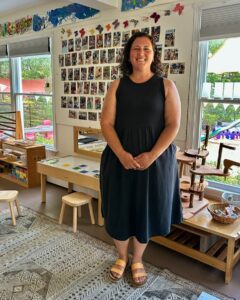PROVINCETOWN — The infant and toddler child-care program in Provincetown — which is unique in Massachusetts in providing free full-day, year-round care for the children of town residents and town employees, according to program manager Tessa Bry Taylor — was moved outside the purview of the school committee on June 9 so that the program can pursue independent licensure by the state Dept. of Early Education and Care.

State licensure will make the child-care program eligible for various kinds of grant funding, Taylor and departing Provincetown Schools Supt. Gerry Goyette told the select board on June 9 — but to achieve that, the program needs to be independent of the school, which is licensed by a different state agency.
The Early Learning Center will now become a town department supervised by Town Manager Alex Morse and the select board, though it won’t need to move from its current location in the Veterans Memorial Community Center. The select board unanimously endorsed the change, which the school committee had already approved.
The town’s preschool classroom for three-year-olds and pre-kindergarten classroom for four-year-olds are both part of the International Baccalaureate program and will still be supervised by the Provincetown Schools, Taylor told the Independent this week.
“This whole program started small, with only about five kids back in 2010,” Taylor said. “But now it’s grown up — there are three full classrooms here.”
The infant room has two teachers and seven children, while the two toddler rooms each have two teachers and nine children — ratios that are set by the state, Taylor said. There are only 10 infant child-care spots on the entire Outer Cape, she said, with the other three being at the Cape Cod Children’s Place in Eastham.
The 25 spots in Provincetown’s infant and toddler classrooms actually support a larger number of children, Taylor said: 27 during the spring semester that is now ending, and 32 in the fall semester that begins in September. Eighty percent of the children at the Early Learning Center are Provincetown residents or the children of town employees and attend for free, but the other 20 percent live in other towns and pay tuition with a combination of town-provided vouchers and out-of-pocket payments.
The vouchers don’t cover a full year of care, so many families split weeks at the Early Learning Center, with one child attending for three days per week while another child attends for two, Taylor said.
“Our rate is $75 per day for infants and toddlers, which is pretty standard in this state,” Taylor said. “Truro’s voucher is for $7,448 this year, Wellfleet’s is for $7,000, and Eastham’s is for $5,000, although once you’re four years old in Eastham it jumps to $10,000.”

At $75 per day, 20 days of child care per month comes to $1,500. Fifty weeks of care per year would cost $18,750. Even the most generous of the Outer Cape vouchers, the $7,448 offered by Truro, covers less than half of that.
“Families will go part-time to stretch out the money, or they will apply for state-based subsidies, which is another piece of the licensing puzzle here,” Taylor said. Being licensed as a child-care center rather than operating under an “exemption” as part of the school will help some families be able to get state vouchers to help them pay tuition, she said.
Taylor said that child-care costs in Boston are much higher. “We were paying $65,000 per year to have two kids in day care when we lived in Boston,” she said. The Outer Cape is “a very different scene” for the parents of young children, thanks to taxpayer support for the costs of child care, Taylor said.
Attention Is Expensive
The Independent asked Taylor and Nola Glatzel, who owns the Earthstar Play School in Truro, about the costs of offering child care.

They each said that there are many state rules about child-care centers, including emergency exits, child-proof drawers, and even limits on the temperature of running water. Glatzel said there are 80 pages of regulations for home-based child-care centers like hers.
Nonetheless, they both said the primary reason child care is expensive is that it takes a lot of adult attention to care for toddlers.
There are 10 two- and three-year-olds at Earthstar at any one time, Glatzel said, “and this year, every single child except one was potty training. Imagine putting on snowsuits and mittens and hats and they’re all potty training.”
State rules require Earthstar to have two adults to care for 10 toddlers, but Glatzel prefers to have three.
“You have to be so present at every moment, and it’s so hands-on,” Glatzel said. “They don’t know how to blow their noses — you say to them, ‘Let’s blow your nose,’ and they just look at you. Every moment is like that.”
The state allows 20 students in each pre-kindergarten class for four-year-olds, Taylor said, which is the primary reason that pre-K costs less: $45 per day in Provincetown for out-of-town students. Once children reach kindergarten, school is free for the next 13 years, and students can use school choice to attend out-of-district schools.
Even though they’re still part of the Provincetown Schools, the preschool classroom for three-year-olds and the pre-K classroom for four-year-olds are not covered by school choice laws, so out-of-town students pay to go there, Taylor said.
Paying for child care is “basically like paying for college, except you have no time to prepare for it,” Glatzel said. “As soon as the baby’s born, if the parents work, they have to figure out how to pay for it.”
About half the families on her waitlist signed up before their children were born, Glatzel said.
Cape Cod’s ‘Other Crisis’
Along with high costs, a lack of capacity has bedeviled the child-care sector, and not only in the Outer Cape towns. At a recent meeting of the Seasonal Communities Advisory Council, Alisa Magnotta of the Housing Assistance Corp. described a lack of child-care options as Cape Cod’s “other crisis,” alongside spiraling housing costs.

Even though tuition is a burden on parents, the pay for employees is not particularly high, Glatzel and Taylor both said. Wages have recently increased at the Early Learning Center, Taylor said, but at Earthstar Glatzel pays $22 to $27 per hour, and keeping the business above water is still a struggle.
“I’m never not worried about the financial health of the business,” Glatzel said. “There’s a gap between the true cost of running a high-quality program and what parents are able to pay.”
Per-pupil costs in an elementary school are at least as high as for child care, Glatzel said, but parents aren’t expected to shoulder those costs directly.
“Sen. Elizabeth Warren has said that child care costs so much because tuition is the number-one source of revenue to pay staff,” Taylor said. The reason for town vouchers, state funding, and in the case of Provincetown, town meeting override votes, is “to offset the cost of tuition so that families aren’t bearing the weight of every dollar needed to pay staff better.
“Making it more accessible and affordable for families to be here — that’s the purpose of all this,” Taylor said.
